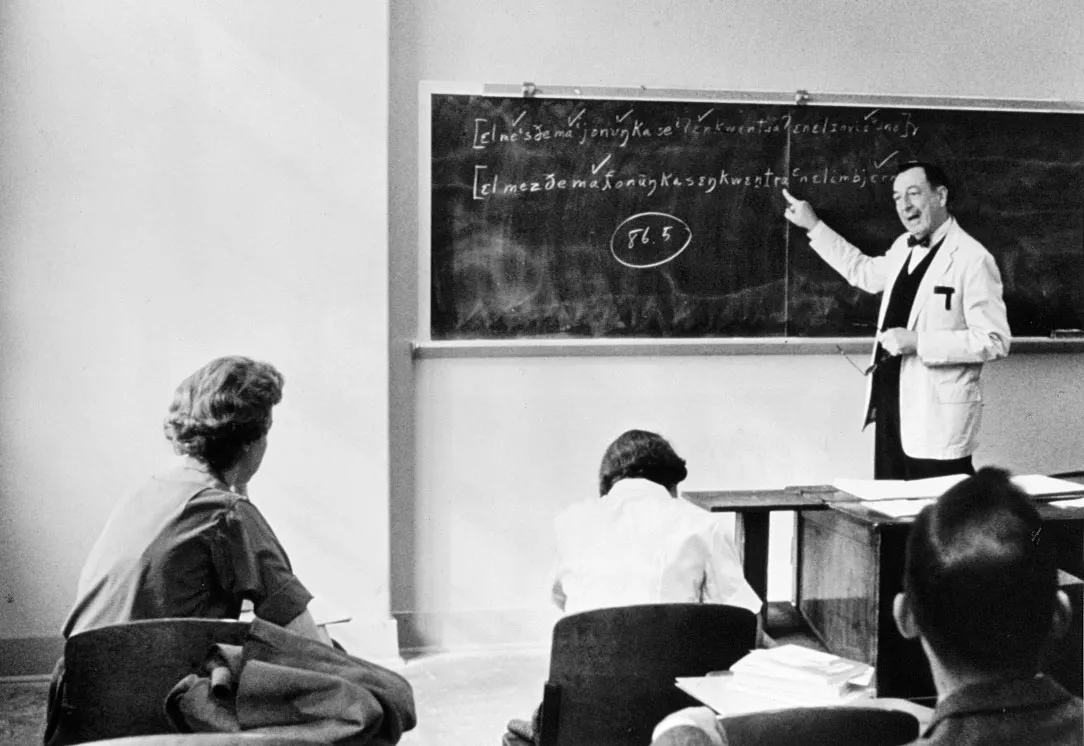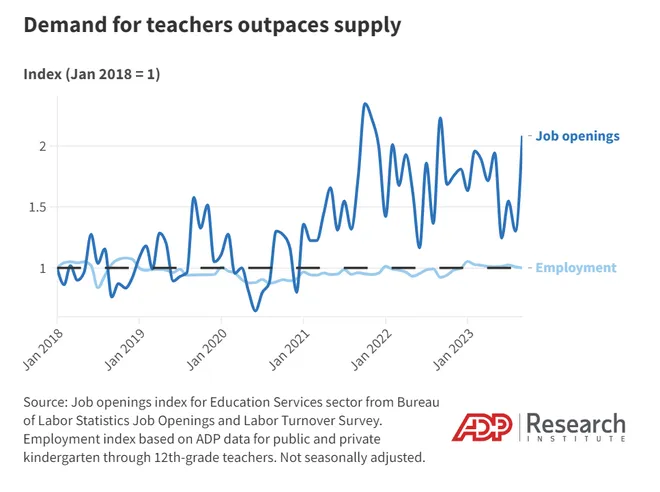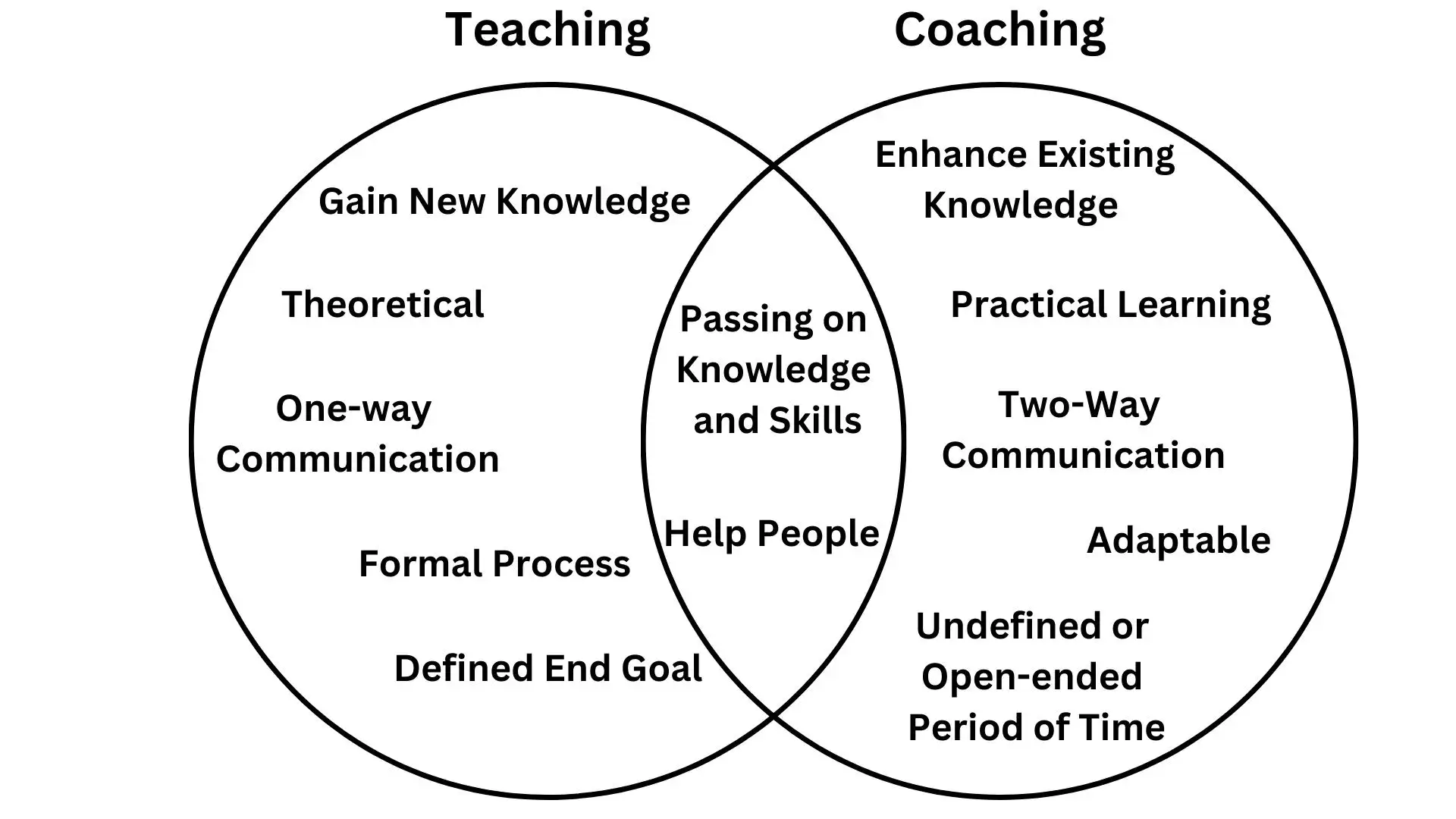
Moonpreneur

Teachers and their teaching techniques, as well as coaches and their coaching strategies, are often discussed. But have you ever pondered the unique nature of these two terms? They are not interchangeable, similar, or dissimilar, but rather distinct in their own right. Coaching is a holistic, iterative process focused on developing a specific aspect of the person being coached. In contrast, teaching is a linear, sequential method primarily involving one-way communication to impart new information.
Moonpreneur
History of Coaching

Image Source: https://www.britannica.com/
The distinction between coaching and teaching has evolved over time, and there are numerous stories about the origins of coaching. Some say the term “Coach” was coined in 1830, and Oxford University defined it as slang for a tutor. Others claim that the term “coaching” originated in the later part of the 1880s.
This graph presents data on the demand for permanent and contract jobs.
Who established coaching as a profession?
Coaching as a profession was significantly shaped by Thomas Leonard, a financial planner from the United States, in the 1980s. Leonard’s pioneering work earned him the title of the “father of coaching” for his promotion of the Coach 100 approach to acquiring coaching clients, a method that continues to influence the field today.
In 1992, John Whitmore’s influential book “Coaching for Performance” played a pivotal role in defining coaching as “unlocking a person’s potential to maximize their performance” and “helping them to learn rather than teaching them.” This significant contribution led to the recognition of the benefits of coaching beyond sports.
Today, coaching has transcended its traditional boundaries and is now applied in a diverse array of fields, including singing, dancing, writing, financial planning, and many others. This broadening of its scope has opened up new possibilities and opportunities for personal and professional development.
Next on Your Reading List
🔍 A Kid’s Guide to Prompt Engineering: Teaching AI to Think
🔍 Teaching Kids About Boundaries: Building Respect and Responsibility
🔍 Don’t Click That! Teaching Kids to Spot and Avoid Phishing Scams
History of Teaching
 This graph from the ADP Research Institute highlights the growing gap between the demand for teachers and the available supply.
This graph from the ADP Research Institute highlights the growing gap between the demand for teachers and the available supply.
It is unclear who the world’s first teacher was, as coaching and teaching have existed for thousands of years and have evolved throughout history. Different cultures and civilizations have had their distinct forms of education and teaching. According to ancient scriptures, the first teachers in human history were most likely parents or older community members who passed on knowledge and skills to the next generation.
Some key differences and similarities between the two:

Similarities
Coaching and teaching both involve passing on knowledge and skills to others. Both necessitate a certain level of knowledge in the subject matter being taught or coached. Both seek to help people improve or develop in some way.
Differences
When thinking of coaching, sports coaching often comes to mind, and when thinking of teaching, educators in schools and colleges are commonly thought of.
The difference between coaching and teaching is often highlighted by the fact that coaching typically brings to mind sports coaches, while teaching is more commonly associated with educators in schools and colleges.
- The fundamental distinction between teaching and coaching is that teaching is centered on gaining new knowledge and abilities, whereas coaching centers on honing and enhancing existing knowledge and abilities.
- Coaching is practical learning in the real world, whereas teaching is more theoretical. Teaching focuses on acquiring new knowledge and skills, whereas coaching focuses on refining and developing existing knowledge and skills.
- Teaching is frequently viewed as a one-way communication in which the teacher imparts knowledge to the students, whereas coaching is a two-way conversation between the coach and the person being coached.
- Coaching can take place in various settings, including one-on-one sessions, group sessions, or even over the phone or online. In contrast, teaching is typically done in a formal setting such as a classroom.
- Teaching is often seen as a more formal process, with a structured curriculum and set methods. In contrast, coaching is highly adaptable, catering to the individual needs and learning styles of the person being coached. This adaptability empowers the learner, making the learning process more effective and enjoyable.
- Teaching typically has a defined end goal and set timeline, while coaching takes place over an undefined or open-ended period.
- When comparing Coaching to Teaching, coaching is concerned with directing, instructing, and training an individual or a group of people to achieve specific goals and objectives. Teaching assists students in understanding and applying knowledge, concepts, and processes. It consists of the following steps: design, content selection, delivery, evaluation, and reflection.
- Teaching and coaching have distinct approaches. Teaching typically assumes that the student is starting from scratch and has little prior knowledge or skills, while coaching assumes that the student already has some level of knowledge or skill that needs to be refined and honed.
Dive Deeper
🔎 How to Raise a Global Citizen: Teaching Your Child About Variety
🔎 Infographic for kids – How do they help in teaching?
🔎 How to Teach Kids to Control their Emotions
What’s better, coaching or teaching?
Well, it’s not one or the other; it depends on the situation!
Here’s how it works: First, you need teaching to learn the basics and figure out what you know and what you don’t. It helps you see where you might need some extra help, which is where coaching comes in.
Think of a teacher as someone who introduces a subject and gives you the basics. Then, a coach steps in to help you understand even more, like fine-tuning your skills and giving you feedback.
For example, in sports, you learn some basics from a teacher, like a parent or by yourself. Then, a coach comes along to make you even better, fixing your technique and teaching you more about the game.
So, both teaching and coaching are important, and they work together to help you learn and improve.
Looking Ahead
To summarize, teaching and coaching have different approaches, but they both impart knowledge and skills to others. They just have different focuses, settings, and approaches.
Moonpreneur is dedicated to transforming conventional education, preparing the next generation with comprehensive learning experiences. Our Innovator Program equips students with vital skills in AI/ML, Robotics, Coding, Game Development, and App Development, fostering entrepreneurship through hands-on learning. This initiative aims to cultivate the workforce of tomorrow by integrating innovative technologies and practical skills in school curriculums.
Register for a 60-minute free workshop today!
Update: This article was last updated on 7 January 2026 to reflect the accuracy and up-to-date information on the page.



























I am still not convinced how coaching helps my children grow in their own unique way compared to regular teaching?
Coaching empowers individuals by offering personalized guidance and tailored strategies. Unlike traditional teaching, it focuses on unlocking one’s unique strengths and potential. Through active listening and targeted feedback, coaching nurtures self-discovery, fostering a sense of ownership over personal growth and development. This individualized approach sets coaching apart from conventional teaching methods.
Looks like coaching could be the secret sauce for learners with all kinds of styles and needs.
Absolutely! Coaching’s adaptability makes it a potent tool for diverse learners. It hones in on individual styles and needs, customizing strategies for optimal understanding and growth. This personalized approach can unveil untapped potential, making coaching a potential game-changer in education.